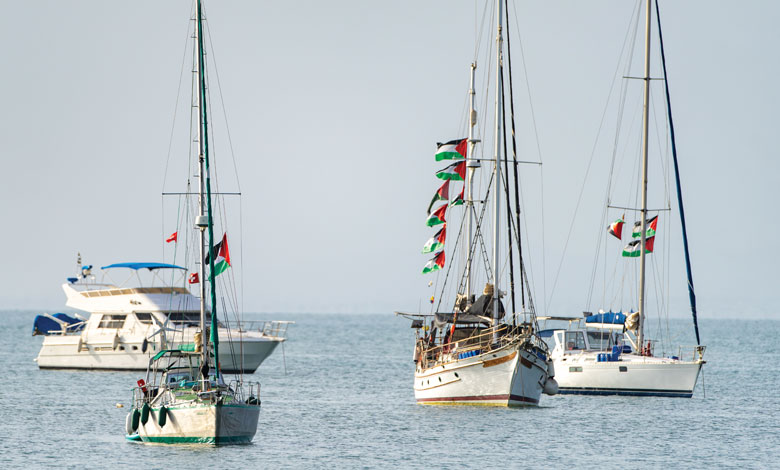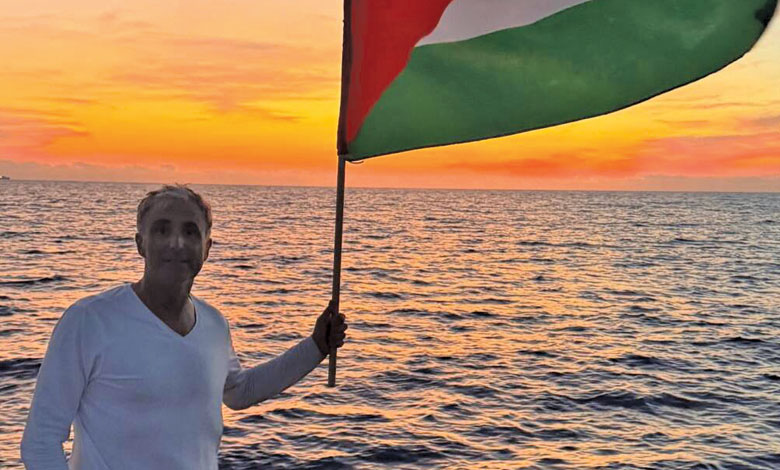‘He started accusing us of being Hamas’: Oireachtas members on being detained in Israel

In October 2025, Israeli forces intercepted international aid flotillas attempting to breach the Gaza naval blockade. Among those on board were Sinn Féin Senator Chris Andrews and independent TD Barry Heneghan. They speak with Ciaran Brennan about the tense interception, Trump’s proposed peace deal, and the Government’s stance on Israel’s actions.
Andrews was aboard the Spectre, part of the Global Sumud Flotilla, which was intercepted by Israeli forces on 2 October 2025, 80 nautical miles out from the blockade by Andrews’ estimation.
Andrews says Israeli forces boarded and forced the group to sit with their hands around their knees for 15 hours. “Throughout all of that, there were Israeli Occupying Forces with guns pointing at you.”
Heneghan, who was aboard the Thousand Madleens flotilla which was intercepted on 8 October 2025, recounts how Israeli forces rammed their boat before they “jumped aboard screaming” and pointed guns at the crew.
“They tore down flags, and they put up the Israeli flags. They said they were the good guys and we were supporting the bad guys. I said: ‘You are just after breaking international law, putting a gun to my head. It is hard to imagine that you are a good guy’,” Heneghan recalls.
Andrews says the aggression intensified when they were directed to the port city of Ashdod. “You are lined up there and it is baking hot. They left us on our knees for two hours, it was so sore,” he recalls.
“Yes, we experienced a small side to the mistreatment, but it is nothing compared to what they are doing to Palestinian life.”
Barry Heneghan TD
Andrews’ group was blindfolded and had their hands cable tied before being transported to Ktzi’ot prison in the Negev desert. While they were held in the cell, Andrews states that Israeli forces woke them up “every hour-and-a-half” to disorientate them.
“The only time we got out of the cell was to visit the judge who asked you to sign a form that you be deported, that you entered the country illegally,” he says. “I did not enter the country illegally, I was kidnapped into the country. But they said: ‘If you do not sign that, you will have to go to court next week’. That was all, as it happened, was not true.”
Heneghan was also instructed to sign documents, one of which stated he had illegally entered Israel. “I said: ‘I did not. I tried to bring humanitarian aid to Palestine’, and I did not sign that one,” he recalls.
“There was a document that said: ‘You waive the right of going to court for 72 hours’. We were told in training that if you sign that one, there is no legal obligation to it. You are not identifying the State of Israel; it is just waiving your rights. I said: ‘Ok, I will sign that one’.”
As Andrews recounts the group’s mistreatment at the hands of the Israeli forces, he is quick to stress that “anything that happened to me and my colleagues is nothing compared to what happens to Palestinian prisoners”.
Heneghan echoes this sentiment: “Yes, we experienced a small side to the mistreatment, but it is nothing compared to what they are doing to Palestinian life.”
Andrews recalls how on 2 October 2025, Israel’s Security Minister Itamar Ben-Gvir entered his cell accompanied by armed IDF soldiers who were flanked by guard dogs. “He started accusing us of being Hamas: ‘You are Hamas, you are baby killers, you are killing Jews, you are terrorists. This is a terrorist prison and you are going to be in it for a very long time’,” says Andrews.
“I think we would have been in it a lot longer except for that peace deal that was signed. They did not want citizens from 44 nations hanging around raining on their parade, complaining.”
Trump’s peace deal
Both are critical of US President Donald Trump’s 20-point peace plan, the first phase of which has been agreed upon by Israel and Hamas. This includes a ceasefire, increased provision of aid to Gaza, the first of three stages in the withdrawal of Israeli forces, the return of Israeli hostages, and the return of Palestinian prisoners and detainees.
“The Government does nothing and Europe does nothing to hold Israel to account and face consequences for its actions.”
Senator Chris Andrews
Further points include governance of Gaza by a “technocratic apolitical Palestinian committee” supervised by a ‘board of peace’ headed and chaired by Trump. It also includes Hamas’ disarmament and its agreement that it will not participate in Gaza’s governance, and deployment of a temporary international stabilisation force (ISF). Hamas has indicated its opposition to the board of peace and the ISF, and has only stated it is willing to discuss its disarmament.
Andrews says: “I would not call it a peace deal. First of all, I do not think Palestinians were involved in the negotiation of it. It is clear it was a ‘take it or leave it’ offer.
“From my point of view, I see it is great there is some respite from the genocide, from the famine, and ongoing terror and racism of Israel. Equally, I am not hopeful that it will last.”
On 19 October 2025, Andrews’ fears were realised as Israel suspended the delivery of aid into Gaza and attacked the exclave, killing 33 people despite the ongoing ceasefire. It claimed that it launched this attack in response to an attack by Hamas.
Irish Government response to Gaza
Andrews asserts that the Irish Government’s response to Israel’s genocide in Gaza has not been sufficient. He says that it has failed to effectively hold Israel to account for its actions and also criticised its “attitude around the Occupied Territories Bill”.
“I would be concerned that they will try to shelve it altogether now in light of this new ‘peace deal’,” says Andrews who criticises the Government for indicating that services will not be included in the Bill.
“It is a watered down, yellow pack version that will really do very little. But, we will see,” he adds.
The senator commends the Government for recognising the State of Palestine in May 2024, but adds that “it should have been done years ago”. Ireland was the 144th State to recognise Palestine.
Andrews also states that the Government “has always been good in terms of funding Palestinian infrastructure”, but adds that “they say and do nothing” when it is destroyed by Israel. “Israel ends up being able to do what it wants and face[s] no consequences,” says Andrews.
“The Government does nothing and Europe does nothing to hold Israel to account and face consequences for its actions.”
When asked if he is satisfied with Sinn Féin’s response, Andrews states: “I am obviously biased, but I genuinely think Sinn Féin has led the way in terms of campaigning for justice for Palestinians and campaigning for recognition of Palestine.”
Sinn Féin received heated criticism from members and supporters in November 2023 over its initial decision to not advocate for the expulsion of then-Israeli Ambassador to Ireland Dana Erlich. The ire supporters directed at Sinn Féin leadership contributed to the party performing a U-turn.
Explaining the party’s initial reluctance to expel Erlich and subsequent reversal of its position, Andrews says: “You do not go from A to Z in one jump. It was about moving strategically forward, increasing the pressure.”
When asked if he wishes the party called for Erlich’s expulsion sooner, Andrews pauses before replying: “You could argue both ways, but I do not think ultimately it did any damage to the campaign.”
On the Government’s response to Israel, Heneghan, who supports the Government as part of Michael Lowry TD’s Regional Independents Group, says: “We need to bring in the Occupied Territories Bill, I do not know what the delay is, and I have called for it since. I faced a bit of criticism as I am supporting the Government, and I voted for the amended Occupied Territories Bill.”
Heneghan asserts that “it is very important that services are included” in the Bill. The independent TD voted against the Occupied Territories Bill when it passed through the Dáil in February 2025. When presented with this fact, he says: “At the time, I was given advice that it would not have stood EU scrutiny.
“I think that was naive of me. I understand that I made a mistake. All I can do now is rectify that mistake.”
Peace prospects
Andrews explains that he is still “processing everything and reflecting on things”, but indicates that the flotilla achieved a positive outcome despite the aid not reaching Gaza. The Sinn Féin senator says it served “to shine a light on Gaza and on the brutality of Israel”.
Heneghan states: “You have to show that what they are doing is completely illegal. If you look at what we did, we were bringing humanitarian aid to a starving population and we were illegally intercepted.”
Andrews reiterates that he is “sceptical” about the prospect of lasting peace in Gaza, adding that he is “fearful for Palestinians”. He explains: “I do not believe they will get justice as they have not had justice in decades.”
Speaking in the days after Israel breached the ceasefire, Heneghan says he remains optimistic that lasting peace can be achieved: “We need to keep the pressure on as much as possible, and the only way for me to keep the pressure on is for me to be optimistic.
“I was on the phone to people from the West Bank and Gaza, and they are optimistic, so I have to be in solidarity with them. I have concerns. All I can do is be optimistic and hope. You have to be. Hope is all we have in this scenario.”






